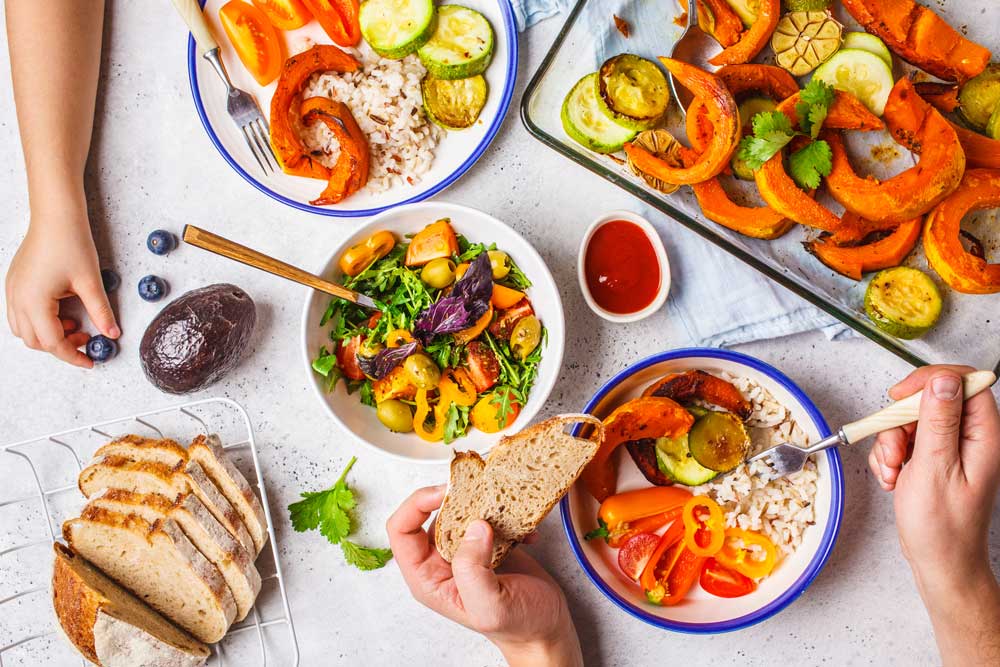What to Eat for Dinner to Lower Cholesterol?
Are you looking for some delicious options for dinner to lower cholesterol? Well, your order is up! Here are 10 foods that scientific research has found to help lower cholesterol levels, and that chefs agree are tasty and easy to prepare. As for how to prepare them, you’ll find recipes here too! It’s time to make some dinner plans. Make a fantastic reservation for tonight at a table that’s serving up heart health.

What Scientists Eat for Dinner to Lower Cholesterol
If you were to ask a scientist what’s the best thing to serve up for dinner to help you lower your cholesterol, they’d probably start to talk about plant stanols, plant sterols, and beta-glucans. These are all nutrients that their consumption has been associated with lower LDL cholesterol. In addition, they likely will talk about how research doesn’t support eating a lot of saturated fat if you’re goal is to eat a dinner to lower your cholesterol. And, trans fats are a terrible idea to serve up any time of day. One fat worth inviting onto your dinner menu is a type of polyunsaturated fatty acid, omega-3 fatty acids shown to decrease some cardiovascular disease risk factors.
Eat Dinner at Home to Lower Your Cholesterol
Interestingly, when researchers looked at 11,000 adults from the United Kingdom to see if where you ate dinner had an impact on cholesterol, they found that those who ate home-cooked meals most frequently, (5 times per week) ate more fruits and vegetables. Vegetables are a star when it comes to foods that promote health. Plus, the study found those adults who ate more home-cooked meals were linked to healthier body weight, less body fat. Most importantly, in the search for what to eat for dinner to lower cholesterol, this study found those who ate home-cooked meals had a lower risk of unhealthy cholesterol ratios, and a lower risk of diabetes (based on markers in their blood work).

Learn More About Pritikin
What is a Good Dinner to Lower My Cholesterol
Beans and vegetables are always great choices for dinner to lower cholesterol. Here’s why. Plant sterols and stanols are naturally occurring compounds that look similar to cholesterol. When you eat plant stanols and sterols they help limit the amount of cholesterol your body can absorb. Over 200 clinical studies have looked at the effects of plant sterols and stanols on blood cholesterol. The evidence is supportive, and prompted the European Food Safety Authority, to make the statement, ‘Plant stanols/sterols have been shown to lower/reduce blood cholesterol’. In the United States, there is a similar statement by the FDA linking plant sterols and stanols with reduces the risk of coronary heart disease. You can find both plant sterols and plant stanols in vegetables (broccoli, cauliflower, Brussel sprouts, tomato), fruits (blueberries, apples), lentils, beans, peas, rice bran, wheat germ, and soybeans. Serve up lots of vegetables for dinner to lower cholesterol – let vegetables be the star of your plate! Beans and lentils are great sources of plant sterols and plant stanols, as well as filling fiber and protein. Get ready to dig in! There are lots of delicious ways to serve up vegetables and beans for dinner, below.
10 Best Foods to Serve Up for Dinner to Lower Cholesterol
- Beans
- Lentils
- Broccoli
- Cauliflower
- Brussel sprouts
- Barley
- Legumes
- Salmon
- Tomatoes
- Peas
Get a Simple Meal Plan
Should I Eat Fiber for Dinner to Lower Cholesterol?
Fiber is another celebrity dinner guest worth inviting to your next meal. Reviewing studies to date, experts commented in the peer-reviewed science journal Nutrients, that fiber is heart-healthy. More specifically, they noted the dietary fiber in whole-grain protein food (e.g. legumes, beans, oats, barley, quinoa), fruits and vegetables make them an attractive target for disease prevention and reduction in the risk of atherosclerosis and cardiovascular disease. Makes you think these foods are attractive items to eat for dinner to lower cholesterol. Soluble fibers, such as pectin and beta-glucan, are in the vegetables (carrots, broccoli, artichokes), fruit (bananas, berries, apples, pears), legumes, barley, and oats, you enjoy often. Soluble fiber intake is associated with lower risks of cardiovascular disease – it absorbs water to form a gel that slows stomach emptying, and slows digestion. Insoluble fibers are great at improving bowel movements, helping relieve constipation. Insoluble fiber such as cellulose is present in whole grain foods and bran. These fibers are used by the good microbes, called probiotics, that live in the intestinal tract to create short-chain fatty acids that are absorbed quickly by the body where they go to the liver and get it to decrease cholesterol synthesis. In other words, eating foods that contain insoluble fibers can help reduce how much cholesterol your liver makes.
Is Salmon a Heart Healthy Dinner?
Catch some salmon for dinner – it’s packed with eicosapentaenoic acid (EPA) and docosahexaenoic acid (DHA), two omega-3 fatty acids that help lower inflammation in the body. That’s great news for those at risk of heart disease! Researchers have found omega-3 fatty acids cause a drop in what is called inflammatory mediators, little messengers that spark the inflammatory response into a higher gear. This has a specific effect on the risk of obesity, cardiovascular disease, and diabetes mellitus type-2. Dish up a little salmon on your dinner plate every now and then.
Easy Recipes for Dinner to Lower Cholesterol
A hearty bowl of Jamaican Red Beans Soup, or Lebanese Lentil Soup, will warm up your belly while offering delicious spoon-fulls of beans and vegetables. On a busy weeknight, a great dinner to lower cholesterol can be waiting for you at home when you’ve already whipped up a healthy crockpot recipe. Have a fiesta in your kitchen on the weekend, and serve up Fajita Chicken over Black Bean and Lime Quinoa for a festive dinner to lower cholesterol. Or, fiesta in proper plant-style with the award-winning Cilantro-Lime Infused Quinoa with Black Beans. May your weekend celebrations with friends be delicious and healthy with dishes like a Garden Vegetable Potato Salad, a Summer Bean Salad, Grilled Ratatouille, or Sweet Potato and Black Bean Burgers.
What to Eat to Lower Cholesterol
Over the years, the idea of what you should eat for dinner to lower your cholesterol has changed. First, a study called the Lifestyle Heart Trial, had some surprisingly impressive results when adults on a stringent diet had up to a 37% reduction in LDL cholesterol. They ate meals that were mostly vegetables, fruits, and other complex carbohydrates, with some protein (e.g. soybean products, non-fat milk, and yogurt), but low in animal proteins, oils, and processed foods. At the time, the idea sent shock waves across the globe – should olive oil, a touted “healthy” oil, which contains saturated fats be classified as unhealthy to someone trying to lower their cholesterol levels? According to more recent research eating too much fat does appear to trigger inflammation in the body, promoting insulin resistance, and contributing to the development of cardiovascular disease. In scientific papers, the highly restrictive diet with great cholesterol-lowering benefits is called the Ornish diet. But, it’s not a “diet”, because as we all agree, diets do not work. It was a lifestyle. There were more than just changes to what went on the participants’ plates; there was regular daily exercise, and education on how to reduce stress. But, the plan is so stringent, most Americans find adhering to it nearly impossible.
Making changes to your lifestyle, (larger changes if you are trying to reverse disease, smaller if you’re preventing disease) is easier with help, including education on mindset strategies that help you reduce stress in your life, training tips on what exercise is right for your body, and an in-depth explanation of which foods are best to eat, and how to make them. This is how thousands of guests at the luxurious Pritikin Center in Miami, Florida have lowered their cholesterol levels, and gone home to successfully continue a healthy lifestyle, some with the ongoing support of virtual counseling from the Pritikin Center experts.
Immersing yourself in a new healthy lifestyle is the most successful way to achieve the results you desire. Consider results from a study in which people in a clinical setting were given meals known to help reduce cholesterol, were compared to a group of people sent home with information on what to eat to lower their cholesterol. When meals were provided, there was a reduction in LDL cholesterol of up to 30%, while those at home saw a 15% reduction.
Where to Make a Reservation for Dinner to Lower Your Cholesterol?
The Pritikin Center program has shown in over 100 clinical studies to help prevent and reverse the progression of coronary heart disease and other health concerns. The Pritikin Center Program has been developed by and is continuously being updated by, a diverse team of researchers and health experts. Make a reservation at Pritikin and join the experts, for a meal, where she’ll show you how the Pritikin Eating Plan works – a plan that’s improved the cholesterol levels of hundreds of guests. You’ll see it in your own blood labs, done at the Pritikin Center by the medical staff. Work with board-certified physicians, and discover how the Pritikin Program can lower cholesterol naturally.

Get All the Details of a Stay at the Pritikin Center in Your Inbox
REFERENCES
- Frequency of eating home cooked meals and potential benefits for diet and health: cross-sectional analysis of population-based cohort study. Int J Behav Nutr Phys Act 2017; 14: 109.
- Can lifestyle changes reverse coronary heart disese? The Lifestyle Heart Trial. Lancet 1990 Jul 21;336(8780):129-33.
- The effectiveness and efficacy of an intensive cardiac rehabilitation program in 24 sites. Am J Health Promot Mar-Apr 2010;24(4):260-6.
- Food combinations for cholesterol lowering. Nutrition Research Reviews, 2012; 25(2):249-266.
- Dietary fat quality and coronary heart disease prevention: a unified theory based on evolutionary, historical, global and modern perspectives. Curr Treat Options Cardiovasc Med 2009 Aug; 11(4): 289-301.
- Anti-inflammatory effects of omega-3 and omega-6 polyunsaturated fatty acids in cardiovascular disease and metabolic syndrome. Crit Rev Food Sci Nutr 2017 Nov 2;57(16):3421-3429.
- Dietary fiber, atherosclerosis and cardiovascular disease. Nutrients 2019 May; 11(5): 1155.